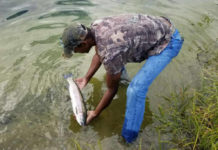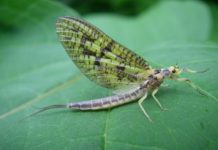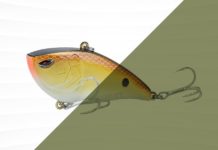Commissioners To Consider Mountain Lion, River Otter Seasons
LINCOLN, Neb. – The Nebraska Game and Parks Commission will consider recommendations for a 2022 mountain lion hunting season, as well as a 2021 river otter harvest season, at its June 11 meeting in Chadron.
The meeting begins at 8 a.m. Mountain time at Chadron State Park’s Central Building, 15951 U.S. Hwy. 385.
Staff will recommend a mountain lion season in the Pine Ridge, identical to the 2021 season, that would have a maximum harvest of four mountain lions, with a sublimit of two females. The objective is to allow a harvest opportunity for mountain lions that allows the population to remain resilient and healthy while limiting future growth or moderately reducing numbers.
The Commission also will consider adopting a Nebraska River Otter Management Plan. The goal of the plan would be to maintain resilient, healthy and socially acceptable river otter populations that are in balance with available habitat and other wildlife species. Changes to Commission orders and regulations will be proposed to implement a harvest season that would allow the trapping of river otters. The proposed season would be Nov. 1, 2021 through Feb. 28, 2022, or close earlier once 75 otters have been harvested.
The proposed regulations can be viewed at nebraska.gov/nesos/rules-and-regs/regtrack/index.cgi. The proposed changes to Commission orders can be viewed at outdoornebraska.gov/regulations.
Commissioners also will consider staff recommendations to approve or reject:
• a proposal to allow the Game and Parks to manage 234 acres of land owned by Pheasants Forever, Inc. which is adjacent to Commission-owned Jack Sinn Wildlife Management Area in Lancaster County. These additional acres would be open to public access and follow the same regulations as the adjacent WMA.
• changes to sport fishing regulations regarding the application and purchase of paddlefish preference points and where a paddlefish permit is valid.
• changes that would add DeFair Lake WMA in Grant County to the list of water bodies where it is illegal to possess or use live baitfish while fishing.
• changes to wildlife regulations that currently prohibit the possession of a firearm while archery and muzzleloader hunting. This change would allow these big game hunters to lawfully carry a handgun with a barrel of no longer than 5 inches.
• changes to clarify hunting restrictions pertaining to the use of bait for big game and turkey.
• changes to add an option to hold special depredation seasons for deer, antelope and elk.
Staff will recommend that the Commission ratifies the Operating and Capital Improvement budgets for fiscal years 2021-2022 and 2022-2023.
The Commission also will consider the formation of a Director Search Committee and hear an update on western Nebraska park improvements, as well as a horticulturist’s report on park habitats across the state.
A complete agenda is available at outdoornebraska.gov/commissioners.
Game And Parks Urges Boaters To Clean, Drain And Dry To Stop Invasive Species
LINCOLN, Neb. – While many Nebraska boaters are eager to enjoy a summer day on the lake, the Nebraska Game and Parks Commission urges them to be wary of a nasty hitchhiker: the zebra mussel.
Over the Memorial Day weekend, Game and Parks watercraft inspectors found two boats with zebra mussels attached attempting to launch. Each boat was inspected and not allowed to launch with viable zebra mussels. Watercraft inspectors are present throughout the state this summer at various water bodies to prevent the spread of invasive species.
Zebra mussels can live up to two weeks out of water and young zebra mussels – or veligers – are invisible to the naked eye and can be spread through any water left undrained. Boaters should clean all visible plants, mud, or animals, drain all water within the boat, including the motor, and dry their boat for five days before going to another water body.
Game and Parks regulations require anglers, hunters and boaters conduct clean, drain and dry procedures before leaving a water body; they also are not allowed to arrive at a new one with any water from another water body.
“Frankly, we need the public’s help this summer,” said Kristopher Stahr, Game and Parks aquatic invasive species program manager. “Once established, zebra mussels can be devastating to a water body and prevention is the best tool we have. Surrounding states have been greatly impacted by zebra mussel invasions, and we want to keep Nebraska waters invasive-free, now and for future generations.”
A zebra mussel is a highly invasive aquatic species that looks like a D-shaped clam, with alternating light and dark bands. Most zebra mussels are less than an inch long. They form dense colonies and filter large quantities of plankton from water, decreasing the food supply for native species.
In addition, these mussels pollute swimming areas with sharp shells and clog water intake pipes. The Missouri River has an existing zebra mussel population along its entire length downstream of Gavins Point Dam. Lewis and Clark Lake, Lake Yankton and the Offutt Base Lake are the only other confirmed Nebraska waters that have established zebra mussel populations.
Visit stopaquatichitchhikers.org for more details on the Clean, Drain, Dry Procedure and neinvasives.com for information about invasive species in the state.
The public is encouraged to report any suspected observation of zebra mussels or other aquatic invasive species to Game and Parks at 402-471-7602 or at ngpc.ais@nebraska.gov.
Game And Parks Offers Tools For Landowners Experiencing Wildlife Damage
LINCOLN, Neb. – The Nebraska Game and Parks Commission reminds landowners there are tools and resources available to those experiencing crop and livestock damage due to wildlife.
Landowners can contact their nearest Game and Parks district office to discuss options to alleviate damage, such as scare devices, fences, damage control permits or opening lands to public access for hunting. Find an office at outdoornebraska.gov/locations.
In addition, landowners can go online to relate wildlife damage issues to Game and Parks at outdoornebraska.gov/depredation.
Big game wildlife populations are best managed through hunting. In 2021, Game and Parks increased tags for deer, antelope and elk. Antlerless elk permits increased 75% from 2020 numbers, with early and late season splits in most units to focus hunters into desired seasons. The January River Antlerless season now will run the entire month of January to focus on areas with higher deer populations.
Game and Parks continues to offer the Antlerless Hunter Database, which connects hunters who wish to harvest antlerless deer with landowners who are experiencing damage issues from deer on their property. Learn more at Outdoornebraska.gov/antlerlesshunterdatabase/.
Key To Mentoring New Angler: Keep It Simple
LINCOLN, Neb. – Consider your motivations on why you enjoy fishing. Is it to catch a meal, compete for the largest fish, get away from life’s stresses or to be with friends?
To faithfully mentor a new angler, whether they be young or old, one probably should start by asking why the angler wants to fish. The angler might have some experience but still be seeking to learn. From there, add the time, place and equipment necessary to have enjoyable fishing trips together.
Keep it simple. The first dabblings into any new hobby should be about discovering the basics. With fishing, this means to keep the equipment simple and effective. Fancy gear and tackle tend to need an experienced touch and can be intimidating to learn. First experiences should be comfortable and successful. Your friend’s memory of a beautiful sunset and any fish caught will hook them on angling for life.
Plan the fishing trip location for comfort and success. If the person is new to fishing, a short fishing trip to a park-like setting is perfect. City park ponds can be found across Nebraska that include groomed shorelines, restrooms and nearby services, with most of these containing plentiful bluegill, bass and catfish. The Nebraska Fishing Guide’s Public Fishing Areas section lists these special locations as Family Friendly Lakes. If your mentee is a little more experienced and wanting to learn fly-fishing, for instance, the groomed shorelines of park ponds are ideal casting practice locations, and bluegill are very susceptible to many types of artificial flies.
It is important the fishing equipment you introduce your friend to is good quality and complements the fishing experience. If a beginning angler is having trouble with a bad fishing rod and reel, he or she will be frustrated. The friend will not know if it’s equipment failure or the technique. The same is true if the equipment is complicated to use. Start a beginning angler with a push-button spin-casting reel and move more experienced anglers into spinning reels when it is appropriate. Bait-casting reels are too complicated and frustrating, unless you are mentoring an experienced bass angler.
Hope for beginner’s luck in catching a trophy fish but strive to catch any fish so the new angler is encouraged to continue. Panfish, such as bluegill, green sunfish and crappie, are plentiful statewide, easy to catch, and can be turned into a wonderful meal to give a second reward from a fishing trip.
Channel catfish offer the opportunity to catch a bigger fish with slightly more advanced techniques. Catfish are found statewide, but you can teach your mentee about finding great location by showing them the annual Fishing Forecast, which is published by the Nebraska Game and Parks Commission. Bass and walleye usually require a little more experience and are a great fish for teaching new equipment such as lures and spin casting rods and reels.
Experienced anglers know observing the success of others often is a key to our own success. Encourage beginning anglers to observe and ask questions. Information is widely available. Online resources include blogs, forums, videos and printed media. Game and Parks’ website (outdoornebraska.org) includes all of these with links on where and how to fish. The book Going Fishing (outdoornebraska.gov/howtofish) is available free to help you and your mentee with suggestions and details you may have overlooked.
And don’t forget their fishing permit, which can be purchased online and displayed on a mobile device.
Trout In The Classroom Applications Being Accepted
LINCOLN, Neb. — Trout in the Classroom, a Nebraska Game and Parks Commission educational opportunity for schools and classrooms, will be accepting applications for the 2021-22 school year starting June 1.
The interdisciplinary, science-based curriculum invites classrooms and schools to explore aquatic ecosystems, life cycles, water quality and the scientific process through raising trout eggs in their classroom during the spring semester.
“My students absolutely love this program,” wrote one teacher about the 2020-21 program. “There is so much value in not just raising the trout, but also the education aspect.”
Applications are due Aug. 31. Learn more about the program at OutdoorNebraska.org/TroutInTheClassroom.
For more information, contact Grace Gaard at grace.gaard@nebraska.gov.
Credit: Source link































